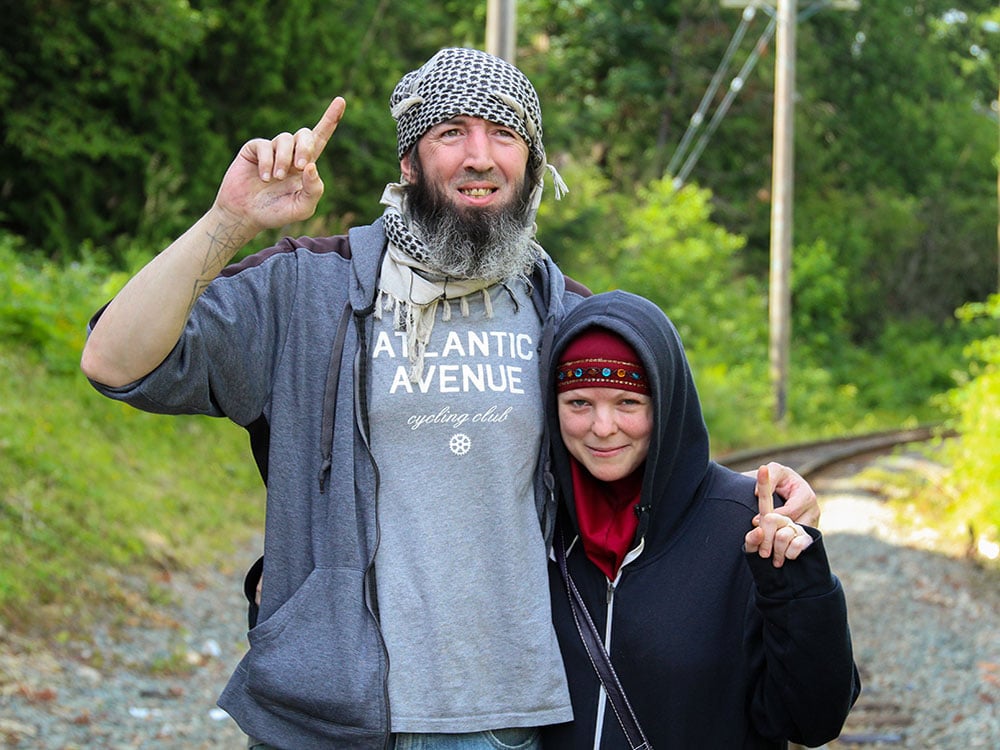The story of John Nuttall and Amanda Korody reads a little like a John le Carré novel, if it was written by the Trailer Park Boys.
You can’t make this stuff up. Or can you?
In 2015, Nuttall and his common-law wife Korody were found guilty of terrorism after plotting to plant pressure cooker bombs — explosive devices filled with nuts, bolts, nails and other material that can kill or maim people — at the provincial legislature on Canada Day in 2013. The plan was supposedly foiled by the police and the couple were brought to justice.
But that was just the beginning of the story. When B.C. Supreme Court Justice Catherine Bruce ruled that the pair had, in fact, been entrapped by the RCMP in an investigation that crossed a number of ethical and procedural lines, things got messy.
The border between truth and fiction is difficult enough to parse without active muddying. But that is what happened in the case of Surrey, B.C., residents Nuttall and Korody. How it happened is the subject of Pressure Cooker, a new limited-series podcast from Vancouver filmmaker Dan Pierce. The series launched Sept. 6 on CBC.
Authorities had begun investigating Nuttall in 2012, after receiving a tip that he had killed a Jewish woman. He later maintained that he’d made the story up.
Nuttall converted to Islam in 2011 and had come under greater police scrutiny after a neighbour reported his unusual behaviour — which included speaking loudly on a phone about blowing up Islamic countries.
At the time, the ground war in Afghanistan was still raging. In April 2013, the Boston Marathon bombing rocked the U.S. The collective fear of terrorism was palpable.
Project Souvenir, a joint operation between the Canadian Security Intelligence Service and the RCMP, was launched, with undercover police officers befriending Nuttall and Korody, who were described by police as “self-radicalized” and “inspired by al-Qaida ideology.” An agent worked hard to convince the pair that their over-the-top plans to bring about jihad, or holy war, could have a major impact on world events.
Although aspirations to build rockets and hijack a submarine were eventually abandoned in favour of more attainable violence (you can build a pressure cooker bomb with ingredients from any hardware store), even the simplest schemes went awry as the couple were either high on drugs, playing video games or simply not capable of completing even simple tasks such as buying necessary supplies to build the bombs.
It was the couple’s ineptitude that contributed to Bruce overturning their terror convictions after a jury found them guilty in 2016.
In her dismissal of the case, she said calling Nuttall, then 41, and Korody, 33, "unsophisticated" would be generous. The RCMP essentially manufactured the crime and then arrested the pair, Bruce found, and the case was a “travesty of justice.” In 2018, the B.C. Appeal Court upheld the ruling.
What a long, strange trip it’s been
The strangeness of the story attracted the attention of filmmaker Pierce, who had initially envisioned making a feature film. But instead of a dark and satirical retelling, Pierce decided to focus on the love story at the centre of events — an idea that resonated with the couple.
As he explains: “They’ve been through so much — homelessness, jail, addiction — and they’re still in love, still together.”
Pierce began interviewing Nuttall and Korody, amassing hours of conversation. The decision to retell their experience as a podcast wasn’t initially what they expected, Pierce says. They originally thought their roles would be played by actors, so the idea of using their real voices came as a bit of a change in direction. But in marshalling the sheer amount of information — audio recordings, surveillance tapes, as well as hours of personal interviews — a podcast turned out to be ideal. As opposed to a 90-minute feature film, the format allowed Pierce to dive deep, looking at the couple’s backstory, interviewing family and friends in order to provide greater context.
Was it difficult for them to revisit certain events?
“Not really, they had a story to tell,” says Pierce.
Even in its most straightforward retelling, that story is pretty out there.
So, where to begin?

Pierce has started working on the story after reading a Vice piece on the court proceedings. Producer Sarah Berman, a friend of Pierce’s and a Tyee alumna, was covering the couple’s trial for Vice and brought him in to do some filming.
Pierce explains that painting the audio-only scene for an audience requires a careful balance of narrative, character and events. Some of the early interviews took place outside (you can hear the SkyTrain in the background) or in the couple’s apartment. This variation lends an authentic, seat-of- your-pants quality that wouldn’t have been achievable in a more formal interview style.
Pierce points out listeners can hear this rough-and-ready approach even in Nuttall’s delivery, which ranges from conspiratorial whispers to shouting at the top his lungs.
“I wish I could show some of the video tapes,” Pierce says.
He goes on to describe one particular sequence, where “John’s eyes are just flitting back and forth, and his jaw is hanging open. You can see on his face that he is really high.”
This gonzo journalism quality infuses the journey all along the way, even as things begin to spiral into the realm of complete absurdity. But beneath the more bizarre aspects of the case, there was something more troubling — the RCMP’s commitment to breaking a major terrorism case, even if they had to help create it from scratch.
As one of the interviewees states in the podcast, this was not an isolated event, but an ongoing climate of anti-Muslim suspicion and harassment.
Rumee Ahmed, professor of Islamic law at the University of British Columbia, explains he often receives random phone calls from strangers who insist on meeting in public somewhere. Ahmed laughs, but there is an edge of weariness that creeps into his voice as he describes the calls.
“They’ve ‘met with the great leader, it’s time to attack, and it’s time to build our resources,’ and you know this person is an informant trying to entrap you.”
In the end, with more than 200 officers involved in the case, and a spiralling budget that topped $1 million, the pressure to close the case pushed the RCMP into abandoning caution and stepping over the line that separates careful police work from entrapment.
In addition to providing ferry rides and hotel stays, undercover officers bought the couple groceries — anything to help move the bomb-making plans along. With so many resources dedicated towards the trumped-up case, it’s easy to wonder what other (perhaps more real) threats might have been happening while the authorities’ attention was focused on Project Souvenir.
“It’s impossible to say,” Pierce muses, but if the operation had resulted in thwarting a real terrorist threat, public outrage about the expenditures might not have been so extreme.
As Pierce notes in the podcast, the RCMP declined to be interviewed. But retired Crown prosecutor Peter Eccles did agree to an interview. Eccles still stands by his position that the failure to convict the two for planning a mass murder was the court getting it wrong.
The division inside the RCMP itself was another aspect to the story. Whereas one unit was extremely mindful of not crossing the line between building a case and entrapment, the impatience on the part of the investigative unit eventually took over, and the undercover scenarios planned and executed grew increasingly out of control.
This Keystone Cops quality, juxtaposed with a potential terror incident, makes for an uneasy frisson. Amid the entertainment and absurdity, it’s easy to forget that the couple had aimed to have explosives go off in the midst of a public celebration, when families and children would be present. Surveillance footage released during their trial showed them making the pressure-cooker bombs in a hotel room in Delta and then planting the devices at the legislature. Fortunately, the bombs didn't detonate.
As Pierce unpacks Nuttall’s and Korody’s motivations, namely terrorism and the belief that if they failed in their mission they would be killed by al-Qaida operatives, reality sails out the window. But beneath the Jason Bourne movie references, the pathos of the situation comes through in whispered exchanges that the couple recorded when they were left alone by the undercover officers. In these conversations, the pair give voice to their misgivings and uncertainty about their chosen path. In one particular discussion, they come perilously close to the realization that the entire thing is a setup.
But as one of couple’s friends explains in an interview, Nuttall’s inability to see obvious traps was a holdover from their days of playing Dungeons & Dragons role-playing games.
Ultimately, it isn’t Nuttall and Korody, but the RCMP who, charged with the responsibility of public safety, arguably abandoned their own regulations in the operation.
As Justice Bruce stated in her 2016 ruling: “Simply put, the world has enough terrorists.... We do not need the police to create more out of marginalized people who have neither the capacity nor the sufficient motivation to do it themselves."
Why the RCMP persisted as long as they did is the bigger question and casts a decidedly unflattering light on the Canadian justice system. Although the couple were found guilty by a jury, the stay of proceedings in 2016 meant that the verdict was never entered.
The story continues. In August, the couple launched a lawsuit against the investigators and federal prosecutors, as well as the B.C. and Canadian governments. There might still be even more material for Pierce’s feature film yet to come. ![]()
Read more: Rights + Justice, Politics, Media

















Tyee Commenting Guidelines
Comments that violate guidelines risk being deleted, and violations may result in a temporary or permanent user ban. Maintain the spirit of good conversation to stay in the discussion.
*Please note The Tyee is not a forum for spreading misinformation about COVID-19, denying its existence or minimizing its risk to public health.
Do:
Do not: